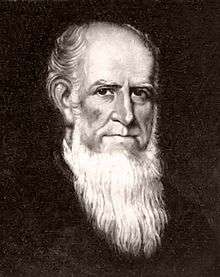Charles Caldwell (physician)
Charles Caldwell (May 14, 1772 – July 9, 1853, Louisville, Kentucky) was a noted 19th-century U.S. physician who is best known for starting what would become the University of Louisville School of Medicine.
Charles Caldwell | |
|---|---|
 Charles Caldwell, from his 1855 autobiography | |
| Born | May 14, 1772 |
| Died | July 9, 1853 (aged 81) Louisville, Kentucky, U.S. |
| Alma mater | University of Pennsylvania |
| Occupation | Physician, academic |
Early life
Charles Caldwell was born on May 14, 1772 in Caswell County, North Carolina. His parents were Irish immigrants. Caldwell earned an M.D. from the University of Pennsylvania School of Medicine in 1796 while studying under Benjamin Rush.
Career
Caldwell practiced medicine in Philadelphia and was a lecturer at his alma mater, the University of Pennsylvania. He also edited the "Port Folio" (one of the day's primary medical magazines) and published over 200 medical publications.[1]
Caldwell was elected a member of the American Antiquarian Society in 1815.[2] A significant number of copies of Caldwell's 18th and 19th century publications, including copies of the Port folio, survive in the collections of the AAS.[3] Other institutions holding original copies of Caldwell's publications include the United States National Library of Medicine, and Harvard's Francis A. Countway Library of Medicine.
In 1819, Caldwell left Philadelphia to join the fledgling medical school at Lexington, Kentucky's Transylvania University, where he quickly turned the school into the region's strongest. In 1821, he convinced the Kentucky General Assembly to purchase $10,000 worth of science and medical books from France, many of which are still held at the university. Despite his success, his "abrasive" and "arrogant" temperament created enemies at Transylvania. The university's medical program would fold soon afterwards. The school dismissed him in 1837, and he then traveled with several colleagues to Louisville, where they created the Louisville Medical Institute. As at Transylvania, he made the new school an instant success, with its rapid growth into one of the region's best medical schools. However, he was forced out in 1849 due to a personal rivalry with Lunsford Yandell.
Caldwell was one of the earliest supporters of polygenism in America. Caldwell attacked the position that environment was the cause of racial differences and argued instead that four races, Caucasian, Mongolian, American Indian, and African, were four different species, created separately by God.[4] Caldwell was one of the earlier of the U.S. physicians who argued for polygenism; his work was subsequently cited by Josiah Nott in Types of Mankind[5] and he was followed by physicians such as Samuel Henry Dickson and John Edwards Holbrook.
Death
Caldwell died on July 9, 1853, Louisville, Kentucky.
Selected works
- An attempt to establish the original sameness of three phenomena of fever (1796)
- A semi-annual oration, on the origin of pestilential diseases (1799)
- An eulogium to the memory of Dr. Samuel Cooper (1799)
- Medical & physical memoirs: containing, among other subjects, a particular enquiry into the origin and nature of the late pestilential epidemics of the United States (1801)
- An oration on the causes of the difference, in point of frequency and force, between the endemic diseases of the United States of America, and those of the countries of Europe (1802)
- An eulogium to the memory of Mr. George Lee (1802)
- An essay on the pestilential or yellow fever: as it prevailed in Philadelphia in the year eighteen hundred and five (1807)
- An anniversary oration on the subject of quarantines (1807)
- An eulogium on Caspar Wistar, M.D., professor of anatomy (1818)
- Outlines of a course of lectures on the institutes of medicine (1823)
- Elements of phrenology (1824)
- Introductory address on independence of intellect (1825)
- Thoughts on febrile miasms (1830)
- An address on the vice of gambling (1834)
- Thoughts on the spirit of improvement, the selection of its objects, and its proper direction (1835)
- Phrenology vindicated, and antiphrenology unmasked (1838)
- Autobiography of Charles Caldwell, M.D (1855)
References
| Wikimedia Commons has media related to Charles Caldwell. |
-

- American Antiquarian Society Members Directory
- AAS online catalog name search for "Caldwell, Charles"
- John P. Jackson, Nadine M. Weidman Race, Racism, and science: social impact and interaction, Rutgers University Press, 2005, p. 45. Caldwell's best-known work on polygenism was Thoughts on the Original Unity of Mankind (New York: E. Bliss 1830).
- J.C. Nott & George R. Gliddon, Types of Mankind (Philadelphia, Lippincott, Grambo, & Co. 1854): 397-98.